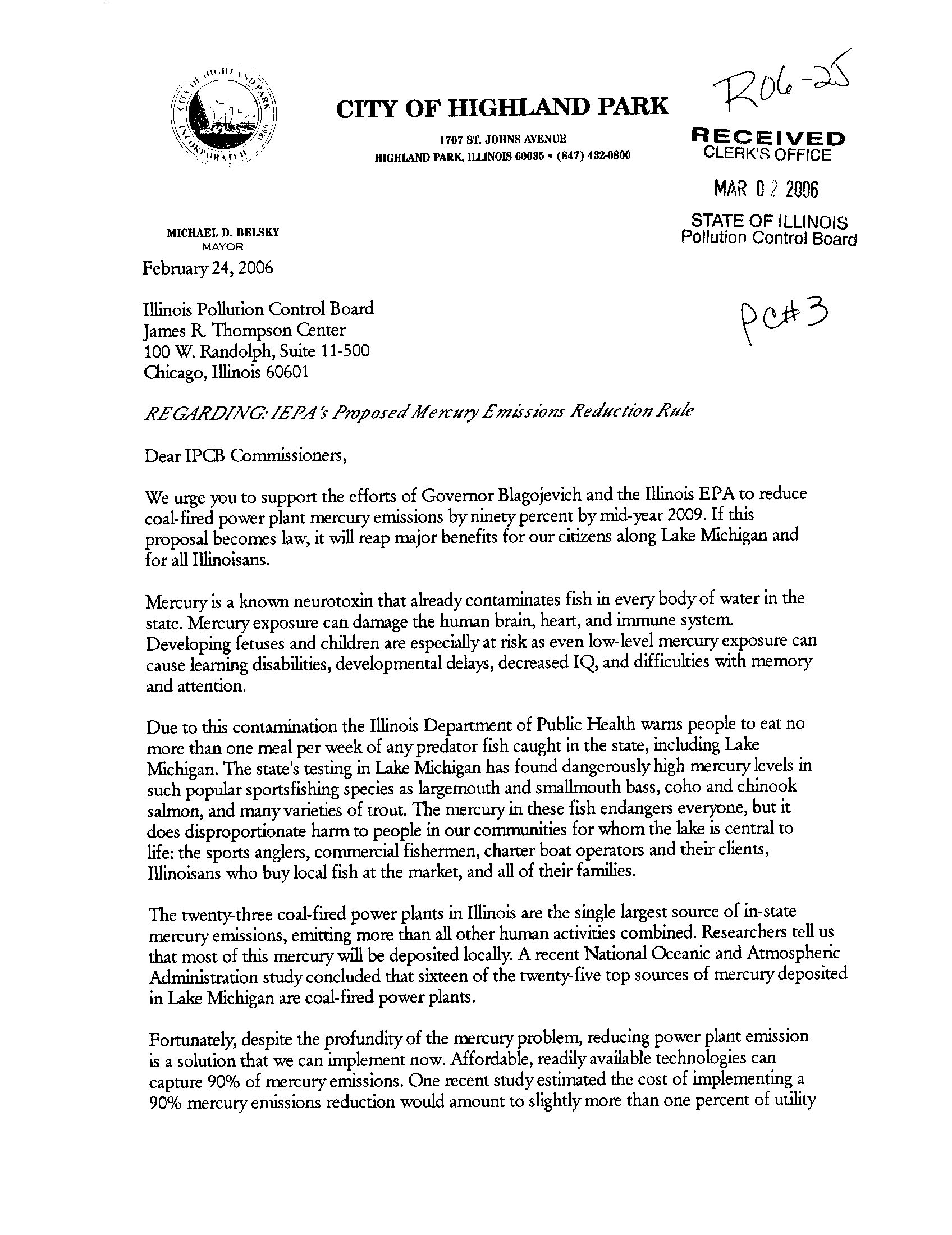MICHAEL D. BELSKY
MAYOR
February 24, 2006
Illinois Pollution Control Board
James R Thompson Center
100 W. Randolph, Suite 11-500
Chicago, Illinois 60601
CITY OF HIGHLAND PARK
1707 ST. JOHNS AVENUE
RECEIVED
HIGHLAND PARK, ILLINOIS 60035
•
(847) 432-0800
CLERK'S OFFICE
MAR 0 2 2006
STATE OF ILLINOIS
Pollution Control Board
R6'GAARDING
.
•IEPAs PtoposediWetruty Emissions Reduction Rule
Dear IPCB Commissioners,
We urge you to support the efforts of Governor Blagojevich and the Illinois EPA to reduce
coal-fired power plant mercury emissions by ninety percent by mid-year 2009 . If this
proposal becomes law, it will reap major benefits for our citizens along Lake Michigan and
for all Illinoisans
.
Mercury is a known neurotoxin that already contaminates fish in every body of water in the
state. Mercury exposure can damage the human brain, heart, and immune system.
Developing fetuses and children are especially at risk as even low-level mercury exposure can
cause learning disabilities, developmental delays, decreased IQ, and difficulties with memory
and attention .
Due to this contamination the Illinois Department of Public Health warns people to eat no
more than one meal per week of any predator fish caught in the state, including Lake
Michigan. The state's testing in Lake Michigan has found dangerously high mercury levels in
such popular sportsfishing species as largemouth and smallmouth bass, coho and chinook
salmon, and manyvarieties of trout . The mercury in these fish endangers everyone, but it
does disproportionate harm to people in our communities for whom the lake is central to
life: the sports anglers, commercial fishermen, charter boat operators and their clients,
Illinoisans who buy local fish at the market, and all of their families
.
The twenty-three coal-fired power plants in Illinois are the single largest source of in-state
mercury emissions, emitting more than all other human activities combined. Researchers tell us
that most of this mercury will be deposited locally . A recent National Oceanic and Atmospheric
Administration study concluded that sixteen of the twenty-five top sources of mercury deposited
in Lake Michigan are coal-fired power plants
.
Fortunately, despite the profundity of the mercury problem, reducing power plant emission
is a solution that we can implement now . Affordable, readily available technologies can
capture 90% of mercury emissions. One recent study estimated the cost of implementing a
90% mercury emissions reduction would amount to slightly more than one
percent
of utility
industry revenues. Shared among customers, that translates to just 69 extra cents per month
per ratepayer .
Right now the federal EPA is implementing weak industry-drafted rules that will delay
meaningful mercury reductions for at least another decade, putting another generation of
developing children and the health of Lake Michigan at risk . But three states have already
put their plants on a schedule to eliminate 90% of their mercury emissions, and our state
should do the same. For the sake of Illinois's 1,237,000 anglers, our 1200 commercial
fishermen, and families that want a healthy environment for their children, and on behalf of
the citizens we represent living near contaminated waters, we ask you to approve of IEPA's
mercury reduction rule .
Sincerely,
Michael D. Belsky
Mayor
MBD:dkg
cc
:
Larry King, Environmental Commission Staff Liaison
